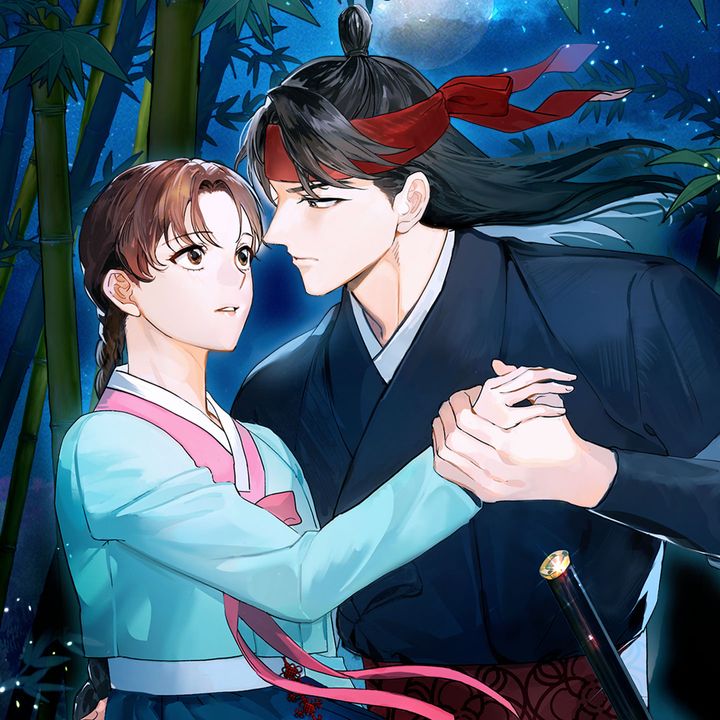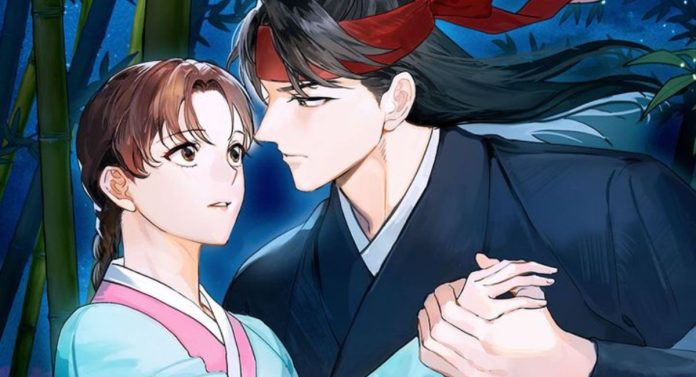Dear Hongrang
Writer: Dokjin
Illustration: Hottu
Original Story: JANG dahye
Localization: Manta Comics
Genre: Romance, Historical

Spoilers: This review contains spoilers for Dear Hongrang manhwa.
A brother who returns from the dead after 10 years; a brother who has acted as his replacement for those 10 years; and a sister who has been searching desperately for her brother to come back. Dear Hongrang was originally a webnovel written by JANG dahye that was later adapted into a webcomic and more recently into a drama adaptation.
The story follows Jaeyi who has been searching for her half-brother Hongrang for years after he disappeared one night. One day, a man who claims to be the long-lost Hongrang appears and throws Jaeyi’s life into chaos. Although she seems to be the only one who doesn’t believe “Hongrang,” she cannot deny that there is something drawing her to him.
Jaeyi is immediately suspicious of Hongrang. Despite his claim that he has lost all his memories of his childhood, she does not believe that the once gentle and sweet boy grew up to be a cold assassin.

Dear Hongrang is a story about family, love, and karma. But at its core, it’s a story about being seen, valued, and respected as a human being. The three main characters–Jaeyi, Hongrang, and Mujin–have been dehumanized on varying levels. Despised by her mother, Jaeyi is locked away in Yoamjae with shattered ceramic jar pieces placed around her residence to prevent her from going out and prevent others from going in. She’s physically and emotionally abused by her parents, most especially by her mother who sees her as nothing but a curse who damned her precious son.
Hongrang and Mujin bear some similarities to each other. Both boys lost their names and were given new ones, with Mujin bearing a name that means “Nothing to finish,” and Hongrang given a name that meant “Bright rainbow” but it wasn’t meant for him at all. Both of them are placeholders for the real Hongrang, and both have been rendered into mere objects.
It also makes Mujin’s final confrontation with Jaeyi so much more heartwrenching. He has an inferiority complex, calling Hongrang a “savage animal,” “hideous,” and a “prop.” In stomping on Hongrang to prove to Jaeyi that he‘s the “better” man, that he’s a real human being, he has descended into a hell that he cannot escape from.
Mujin was sold to Yeolguk Shim by his father to serve as a “placeholder” for the missing son. His position was always a tenuous one and Mujin was fully aware that should Hongrang ever come back, he’d lose everything–and he didn’t have much in the first place, anyway.
Hongrang is the most tragic of all. He’s suffered physical and emotional abuse that no child should ever go through. Even after the perpetrator of the violence was dead, Hongrang’s suffering continued. He’s been called numerous names from “Rat shit” to “Halfwit” to “Shinmyo” to finally, “Hongrang.” And he was given the latter to further his adoptive mother’s revenge plan; she made it clear that she did not give a damn which boy–Hongrang or Inhoe–she took in. We never know what his real name was, and we don’t know if Hongrang knows either.
Throughout his life, he’s been used as a pawn or an object for someone to use. He was thrown into an underground well for three months where he wouldn’t see the light of day so that he could be the “perfect canvas.” His adoptive mother sculpted him into being the perfect assassin, and the perfect image of the real Hongrang, so she could get her revenge. While I don’t deny Hongrang’s pursuit of revenge (I’d be the first one in line supporting him after everything he’s gone through), it does make me wonder if his choice would’ve been different had he been given a choice.
Jaeyi is the only one who has ever seen, really seen, Hongrang and Mujin as people. They felt comfortable when they were with her; they felt happy, they felt hope, so it’s no wonder that the two of them fell in love with her. And when Jaeyi turned her gaze away from them, that ultimately became their downfall–they no longer had a footing to stand on in the world.

I knew, prior to reading Dear Hongrang, that Hongrang wasn’t going to be the real deal and Jaeyi would fall for him, but I was surprised by how quickly their feelings transitioned to romance. She was adamant right from the beginning that Hongrang wasn’t her real brother and although there were times that she wavered in her conviction, she refused to acknowledge him as her real brother. Then, one single remark, one single action, was enough to convince her, and she was treating him like she would the real Hongrang. And then when she found out he had been lying to her (again), she’s back to her conflicting emotions of anger, hatred, and romantic love.
Maybe it’s because she’s been strung so tightly with stress and worry that that was her breaking point. But how could she fall for his lie because of a handful of hazelnuts? It goes against everything she’s done. I also felt a little squeamish when she was starting to have some not-so-sisterly feelings for Hongrang. At that time, she hadn’t found the evidence to prove he was a fake, which meant there was still a possibility that he was her real brother.
In general, I felt like the romantic relationship between Hongrang and Jaeyi was rushed and could’ve been fleshed out more, especially at the end when it felt like it was rushing headlong to the consummation of their love.
Is Hongrang Dead?
The ending is left purposefully ambiguous, which I kind of wish it wasn’t. It felt like the writer/artist was doing it to soften the blow and try to make it a “happy ending.” We don’t always have to have a happy ending and certain stories, like Dear Hongrang for example, work better with an ending that is “sad.” It would’ve worked better had it ended on the scene of Jaeyi having the courage to face the darkness even if she’s alone in the residence that had once caused her so much fear.
Dear Hongrang is undeniably a tragedy. Everything in Hongrang’s life from when he was a child to now was leading him to a point of no return. I’m in, no way, saying that death is the only answer to a person who has suffered unimaginable pain and trauma, but it’s the only ending that seems to make sense for Hongrang’s story.
That being said, I really enjoyed reading Dear Hongrang. While there were some parts that were handled clumsily, like some abrupt flashbacks into the past, and how it was sometimes confusing which perspective those memories belonged to, the unravelling of Hongrang’s past was done exceptionally well. As a tragedy, Dear Hongrang hits all the right notes, but as a romance, it misses its mark a bit.
All 60 episodes of Dear Hongrang can be read on Manta.

